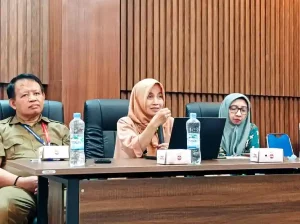UNAIR NEWS – The high rate of child marriages in Indonesia often becomes a problem that hinders the progress and prosperity of civilization in the archipelago. In a discussion held by GirlUp UNAIR on Saturday afternoon, July 17, 2021, a female activist, Olin Monteiro, explained the perspective of feminism on child marriage.
In many dimensions, Olin said that the existence of women is still subordinate to men. The culture limits women to have more access to capital because men are seen as the head of the family, and women must submit to men. The representation of women in parliament in Indonesia is still low as the number of women in DPR members is below 30%. She also added that the stigma against women victims of sexual violence still often exists, such as victim-blaming.
“This subordination of women’s position makes child marriage a gender problem. The persistence of child marriage practice in Indonesia is due to the proliferation of patriarchal culture in traditional values that marginalizes women and children,” said the Coordinator of ArtsforWomen Indonesia.
There are various reasons underlying child marriage. Some of the examples presented by Olin are poverty that makes parents marry their children so they can get them out of the house, lack of education about children’s rights, and the absence of law enforcement so that children can continue to go to school. For this reason, she emphasized that the complexity of this issue cannot be underestimated.
“Often, child marriage happens as parents force their children due to those reasons. Children cannot reject their parents because that’s the existing norms. So, there is a power factor which is certainly detrimental to children, especially girls,” she said.
From a feminist perspective, Olin said that child marriage tends to cause sexual violence because women’s reproductive organs are not ready to carry out sexual activities, and there is a lack of education about sexual health and consent. She added that child marriage also violates the child’s right to education because child marriage tends to make children drop out of school and assume the role of adults too early.
“Economic welfare and domestic violence are also some other risks to child marriages. In 2020, the number of child marriages in Indonesia reached more than 64 thousand. It is, of course, still high even though our legal corridors have prohibited and tried to reduce the number of child marriages,” explained the member of the Indonesian PWAG.
Olin reflects on this problem by emphasizing the importance of comprehensive sexual education (CSE) for children to understand their sexuality and reproductive rights. According to her, this is crucial so that children can become individuals with rights and the capability to respect the dignity of other human beings. It can be done successfully through advocacy and emphasis on DPR to immediately finalize the Elimination of Sexual Violence Bill, which regulates forced marriage to children as sexual violence and regulates CSE.
“Parents must also continue to be educated about children’s rights so that there is an understanding that the practice of child marriage undermines the rights of their own children. Society and young people must also learn about the importance of preparing to become parents, not only because of status or prestige,” she concluded.
Author: Pradnya Wicaksana
Editor: Nuri Hermawan









